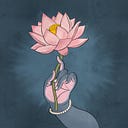Balarāma and Revatī
Revata, of the illustrious lineage of Manu, had a son Raivata, also known as Kakudmin. He was the eldest of one hundred brothers and a man of virtue. Raivata had a daughter named Revatī, whom he took with him to the realm of Brahmā, in order to ask the lotus-born deity for a husband worthy of the girl. Just as he arrived, two gandharvas, Hāhā and Hūhū by name, were singing a heavenly song called ‘Atitāna’ in the presence of the God. Raivata listened to the celestial music for many cycles of ages, yet it seemed to him that he’d only been listening for a moment. At the end of the song, Raivata bowed to Brahmā, the lotus-born deity, and asked that he suggest a suitable husband for his daughter.
Brahmā replied, ‘Tell me, who would you like to marry her?’
Raivata bowed again and mentioned the names of potential suitors of whom he approved, adding, ‘I’ll give my daughter’s hand in marriage to whomever the lord thinks suitable.’
The lotus-born deity nodded and said with a smile, ‘Even the great-grandchildren of those you named are no longer living. Many cycles of ages passed while you listened to the divine song of the gandharvas. At this moment, the twenty-eighth cycle of the present Manu is nearly over, and the age of Kali is about to begin on earth. Give this gem of a girl to someone else. Your friends, ministers, servants, wives, kinsfolk, armies and treasuries have all been swept away by the passage of time.’
The astonished king bowed to Brahmā again and asked, ‘In that case, Lord, to whom should I give her?’
The holy lotus-born preceptor of all the worlds then replied to the king, whose head was slightly bowed and whose hands were joined in supplication:
“The unborn universal arranger, the supreme Lord whose beginning, middle, end, form, highest state and essence are unknown to us, Is beyond time, which, composed of minutes, hours and other units, brings an end to all creation. He is free from birth and death, embodies everything, has neither name nor form, and is eternal. By the grace of that imperishable being, I became the creator of the world and, through his anger, Rudra brings it to an end. In the interim, puruṣa, the Spirit, arises from him to preserve it. The unborn deity takes my form to create the world, maintains it in the form of Spirit and consumes all this in Rudra’s form. That divine being, whose forms are endless, disposes everything. In the form of mighty Indra and the gods, he guards the world; in the form of sun and moon, he dispels gloom. He takes the form of fire to bring us warmth; in the form of earth, he supports the world, yet his essence is unchanging. In the form of breath, he enables all activity; in the form of food and water, he nourishes the world. He occupies all creation and, in the form of ether, provides the space wherein all things abide. He is both creation and creator, the object of protection and the deity who protects it, destroyer and destroyed, but as the changeless universal being he remains distinct from these. The world abides in him, he is the world, the primary being, the self-arising one abiding in all things, yet is superior to all creation. Now, your majesty, Viṣṇu has manifested an aspect of himself on earth. The city of Kuśasthalī, as lovely as Indra’s Amarāvatī and previously your majesty’s capital, is now known as Dvārakā. There resides one Balarāma by name, an aspect of Lord Keśava.
O King! Give your daughter to him in marriage. He is divine illusion in human form, and is a husband worthy of the girl, a fitting partner for that gem of womanhood.”
On reaching the city of Kuśasthalī, which now looked somewhat different, the wise king gave his daughter to Balarāma, whose weapon was a plough and whose broad chest gleamed like a crystal mountain.
Balarāma, who bore a palm tree on his standard, saw the princess and, considering her unnecessarily tall, pressed her down with his ploughshare. She was reduced at once to the height of other women. That plough-wielding warrior duly married King Raivata’s daughter, Revatī. After giving the girl away, Raivata retired to the Himālaya to undertake austerities.
From the Viṣṇu Purāṇa, Ancient Annals of the God with Lotus Eyes translated by McComas Taylor
